A majority of the Scottish public think Michael Matheson should resign over the issue of his £11,000 iPad data roaming bill, according to a poll.
Ipsos’ Scottish Political Monitor, run in partnership with STV News, found 61% believe the health secretary should step down.
Ipsos interviewed a representative sample of 1,004 adults aged 16+ across Scotland between November 20 and 26.
More SNP voters from 2021 think that Matheson should resign (52%) than believe he should continue in his role (44%).
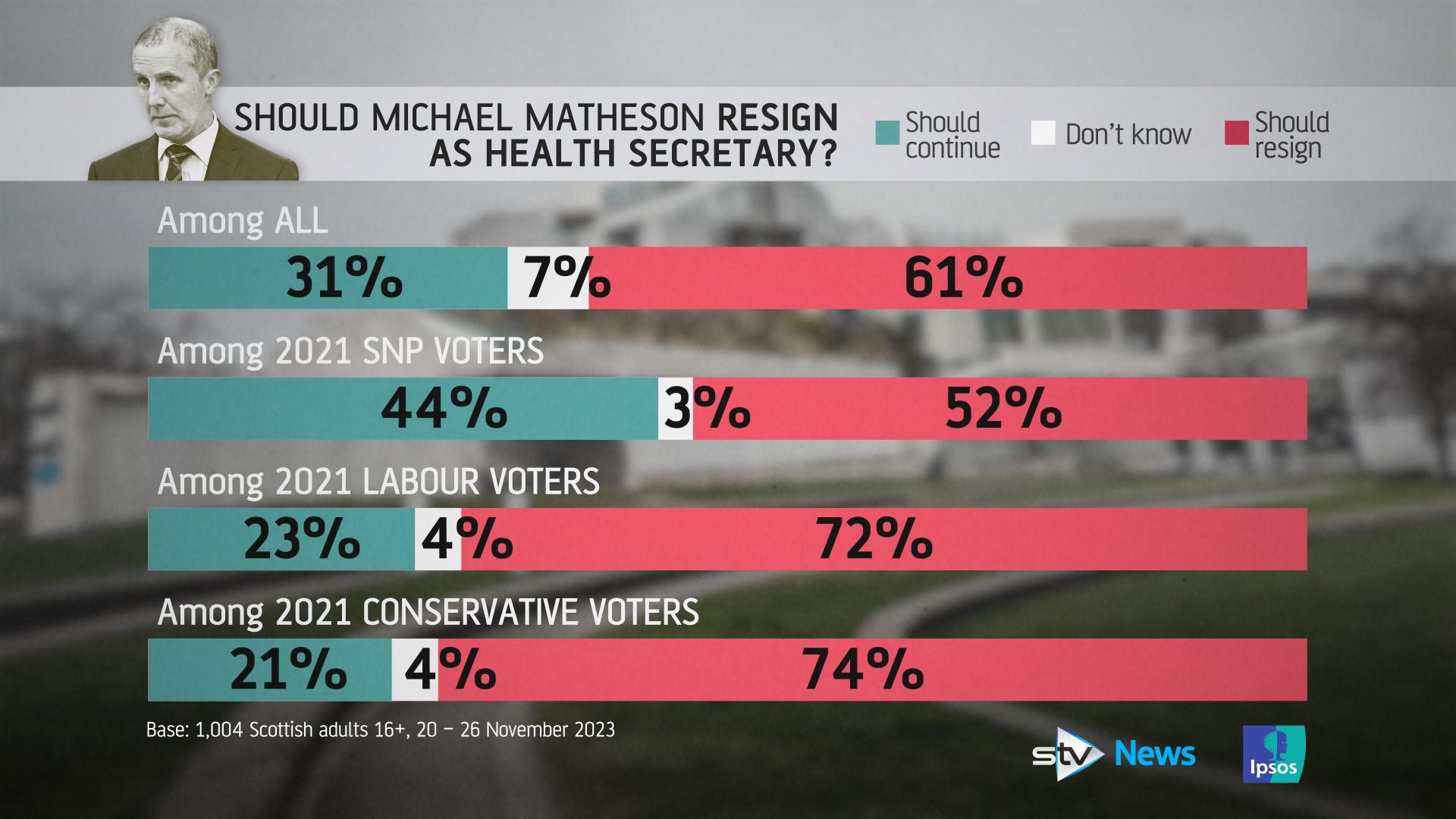 STV News
STV NewsThe Scottish Parliament has launched an investigation into Matheson’s conduct after he racked up an £11,000 roaming bill on an official iPad.
Matheson had initially billed the taxpayer for the charge before saying he would pay it himself months later when it became public knowledge.
He had denied that it was used for personal reasons on his holiday to Morocco in 2022 but later admitted his sons streamed football on it without his knowledge.
In a tearful admission to MSPs earlier this month, the SNP minister said he was trying to protect his family.
Speaking to STV News on Wednesday, Matheson said: “I recognise some of the public concern around this issue.
“Of course, as soon as I became aware that the iPad had been used for personal purposes – unbeknown to me – I took immediate action in order to reimburse the parliament for those costs.
“But I’ve got an important job that I need to get on with. From my point of view, I’ve been very clear about getting on with my job as health secretary – you can see over the course of the last couple of weeks I’ve continued to focus on doing that job.”
Context
-
 Holyrood’s corporate body is carrying out a probe to ensure Matheson followed the MSP Code of Conduct
Holyrood’s corporate body is carrying out a probe to ensure Matheson followed the MSP Code of Conduct -
 The Scottish Tories are pushing for a no-confidence vote in the health secretary
The Scottish Tories are pushing for a no-confidence vote in the health secretary -
 Matheson has agreed to personally pay back the full amount
Matheson has agreed to personally pay back the full amount -
 Humza Yousaf admitted there were ‘mistakes’ made by the health secretary in his handling of the issue
Humza Yousaf admitted there were ‘mistakes’ made by the health secretary in his handling of the issue
UK General Election voting intention
The SNP remains out in front on General Election voting intention, with a lead of ten points over Labour.
Voter preferences are similar to May, with the SNP on 40% (-1 since May), Labour on 30% (+1), the Conservatives on 15% (-2), the Liberal Democrats on 6% (unchanged), the Green Party on 3% (unchanged) and Other on 5% (+2).
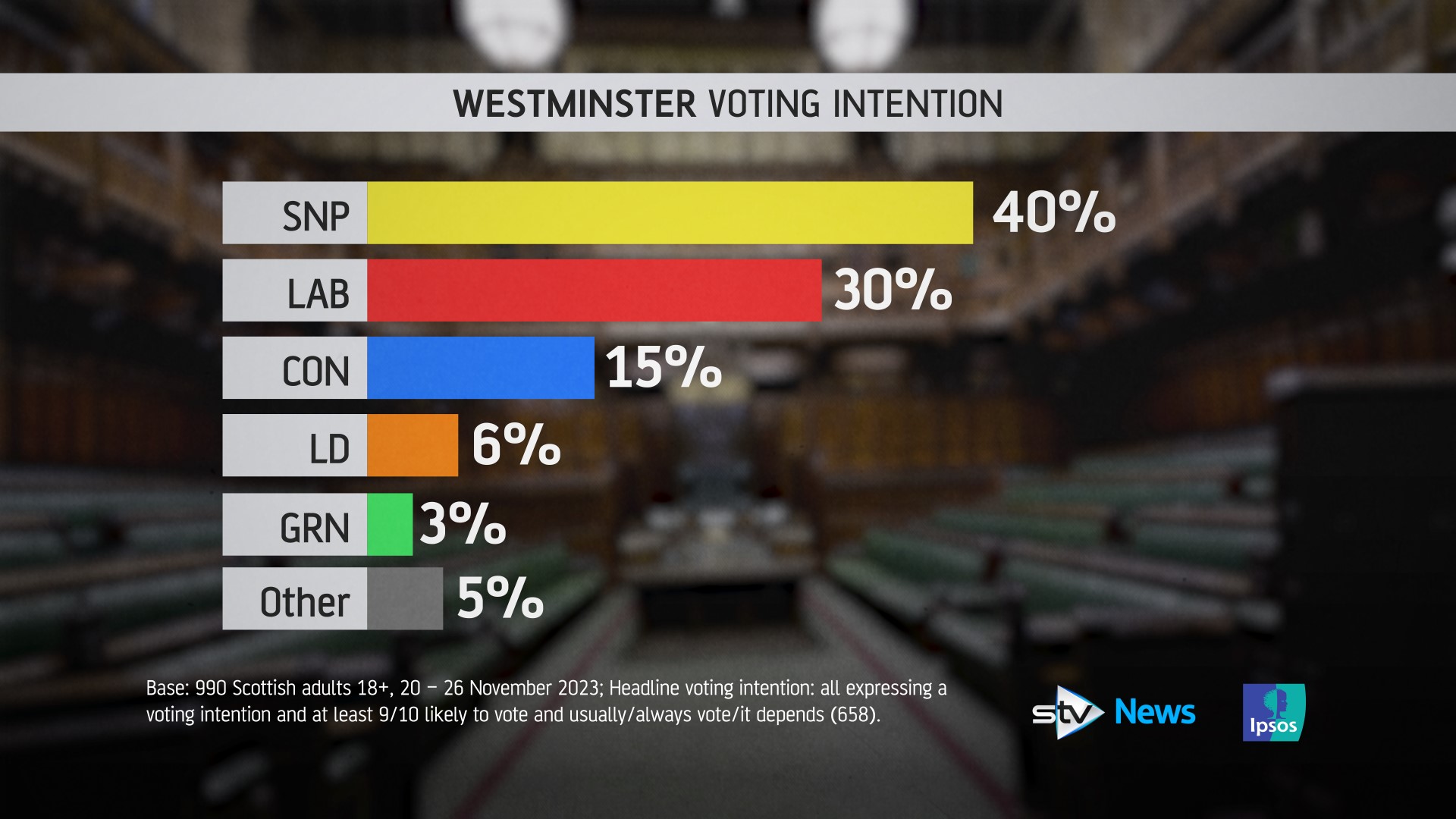 STV News
STV NewsAt 40%, the proportion of likely voters who say they would vote for the SNP in an immediate General Election is five points lower than the 45% who voted for them at the last General Election in December 2019.
The Scottish public are slightly more likely to agree that Labour is ready to form the next UK Government (41%) than to disagree with this (36%).
In contrast, more disagree than agree that Scottish Labour is ready to form the next Scottish Government (45% vs 32%).
There are signs of improvement for Labour in Scotland, however, with a net “ready to govern” rating (the % that agree they are ready to govern in Scotland, minus the % that disagree) of -13 now, compared with -22 a year ago.
The SNP is projected to win 44 seats at the next UK general election. Scottish Labour would take nine seats, while the Scottish Conservatives and the Scottish Liberal Democrats would each win two seats in the House of Commons.
The results are based on Electoral Calculus’ seat predictor model and reflect a change in parliamentary constituency boundaries ahead of the next election.
Scotland has been allocated 57 constituencies for the 2023 Review, two less than at present.
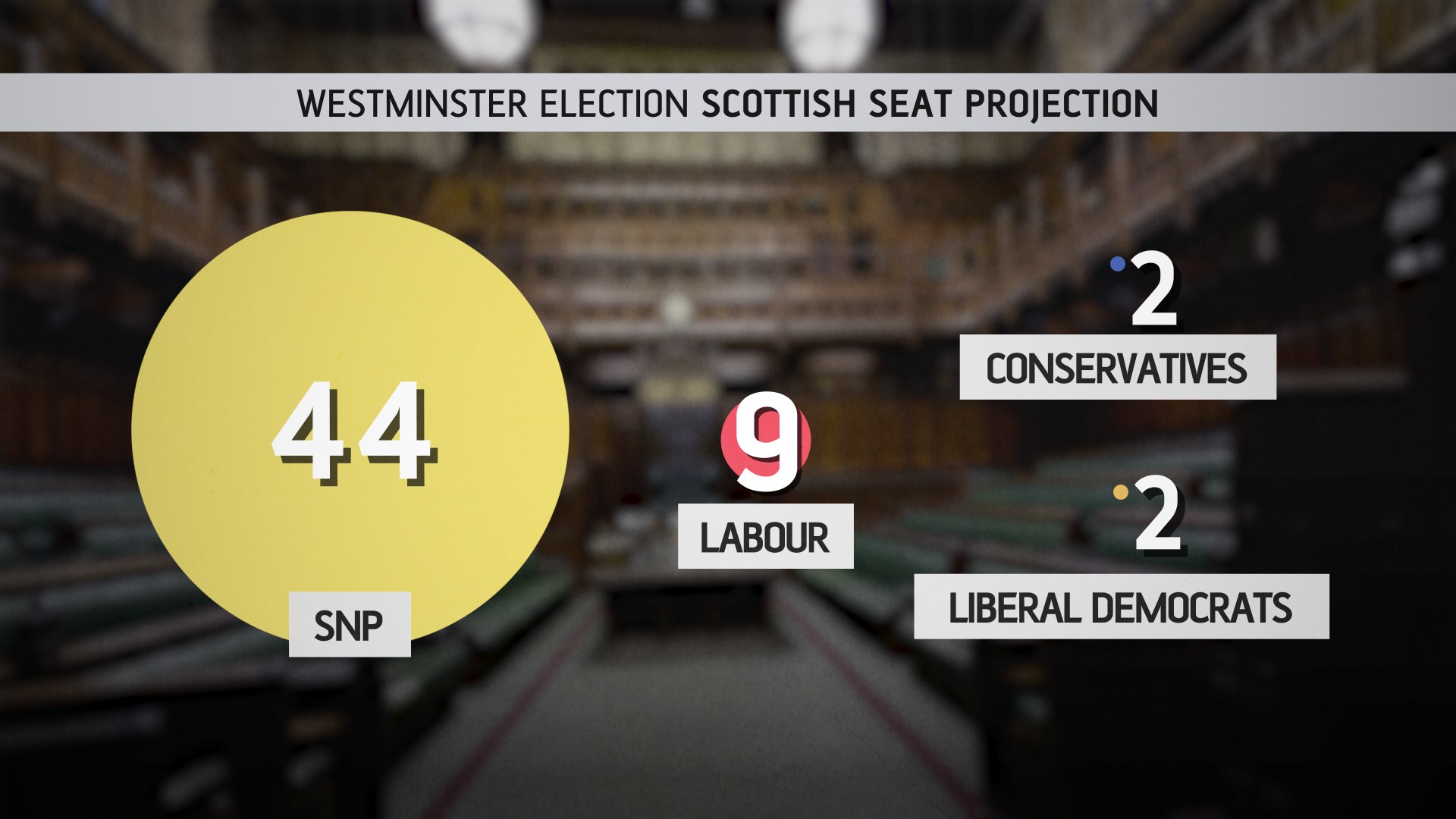 STV News
STV NewsScottish Parliament voting intention
The SNP has a 12 point lead over Labour in Scottish Parliament constituency voting intention.
Again, voter preferences for Holyrood are broadly similar to May, with the SNP on 39% (-3), Labour on 27% (-1), the Conservatives on 15% (-2), the Liberal Democrats on 8% (+1), the Green Party on 4% (unchanged) and Other on 6% (+4).
At 39%, the proportion of likely voters who say they would cast their constituency vote for the SNP in an immediate Holyrood Election is eight points lower than the 47.7% who voted for them at the last Holyrood Election in May 2021. The SNP also lead Labour by seven points on regional list voting intention.
Headline voting intention finds the SNP on 33% (-2), Labour on 26% (-1), the Conservatives on 15% (-2), the Green Party on 10% (-2), the Liberal Democrats on 8% (+3) and Other on 7% (+2).
Independence
The poll shows a small lead for Yes. Among those likely to vote either Yes or No in an immediate referendum, 54% say they would vote Yes and 46% No.
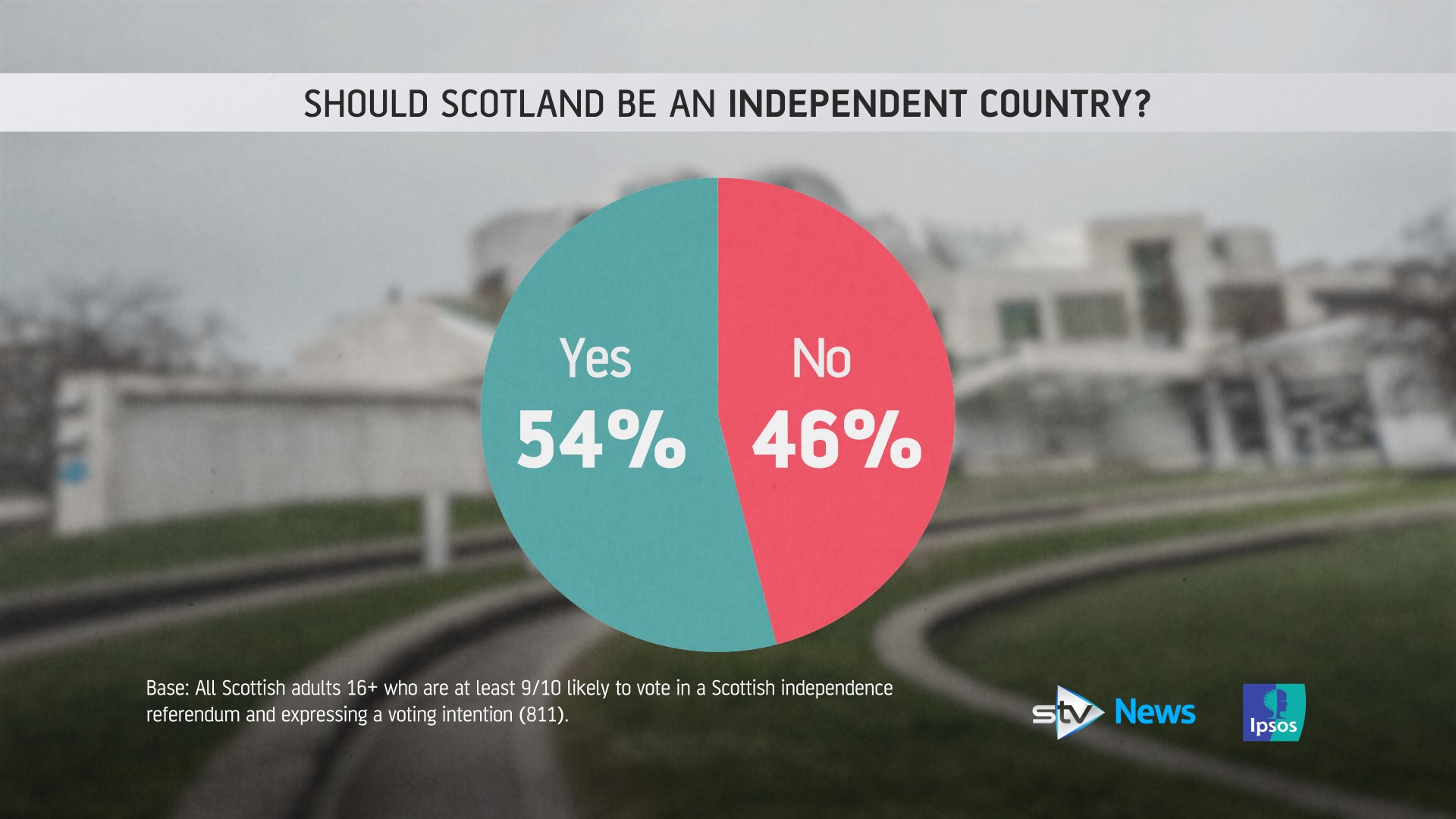 STV News
STV NewsEmily Gray, managing director of Ipsos in Scotland, said: “The Labour Party continues to face a political challenge in Scotland.
“Although the party has made strides in Scotland under Sarwar and Starmer, including the Rutherglen and Hamilton West by-election win in October, this latest poll finds that they remain ten points behind the SNP when it comes to General Election voting intention.
“Although Humza Yousaf’s party have been having a difficult time of late, with controversy over Michael Matheson’s parliamentary iPad data roaming bill of almost £11,000, they remain out in front when it comes to voter preferences for both Westminster and Holyrood elections.”
Leaders
Anas Sarwar is the only political leader asked about in our poll to receive a positive net satisfaction rating, as was also the case in May. 40% are satisfied with his performance as Scottish Labour leader, while 37% are dissatisfied, giving a net satisfaction rating of +3.
Humza Yousaf’s ratings are more negative. 35% are satisfied with his performance as First Minister, while 48% are dissatisfied, giving a net satisfaction rating of -13.
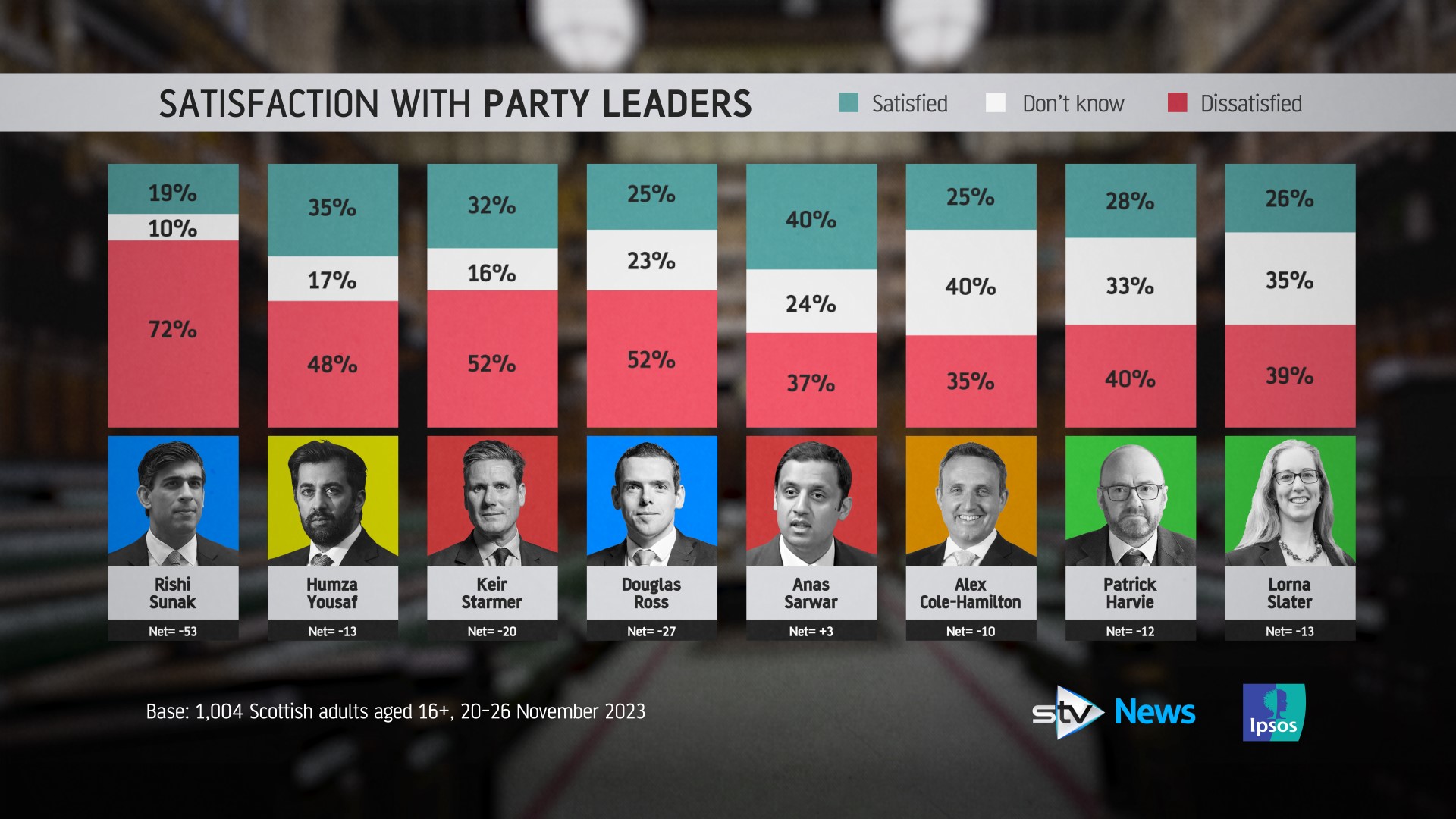 STV News
STV NewsScottish Conservative leader Douglas Ross receives a negative net satisfaction rating of -27.
Dissatisfaction with Rishi Sunak has increased markedly since the last poll. He receives a negative net satisfaction rating from Scots, of -53 (compared with -29 in May 2023 and -21 in December 2022). 19% are satisfied and 72% dissatisfied with his performance as Prime Minister.
New foreign secretary David Cameron also receives a negative net satisfaction rating. However, at -27, it is less negative than both Rishi Sunak’s current rating (-53) and Lord Cameron’s own rating in the latter days of his time as Prime Minister (-38 in April 2016).
Dissatisfaction with Keir Starmer has also increased since May. 32% are satisfied with his performance as leader of the UK Labour Party, while 52% are dissatisfied, giving him a net satisfaction rating of -20 compared with -12 in May.
Key issues
The top five key issues concerning for the Scottish public are:
• Healthcare/NHS (37% mention this as an important issue facing Scotland)
• Inflation/the rising cost of living (25%)
• The economy (23%)
• Education and schools (22%)
• Scottish independence/ devolution (18%)
Follow STV News on WhatsApp
Scan the QR code on your mobile device for all the latest news from around the country





























